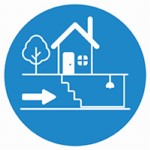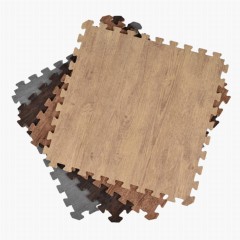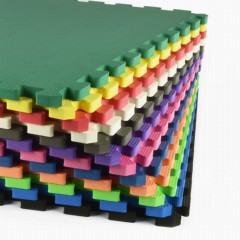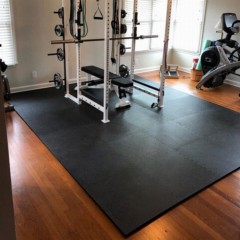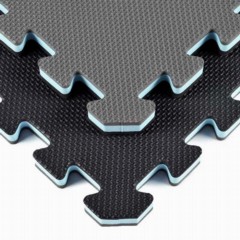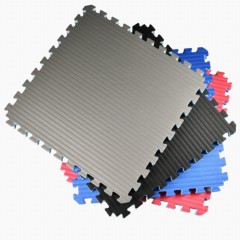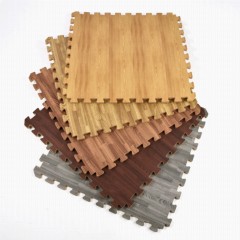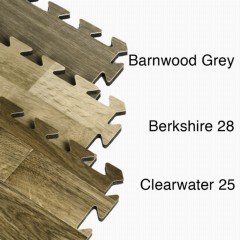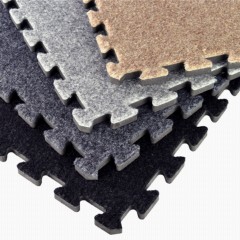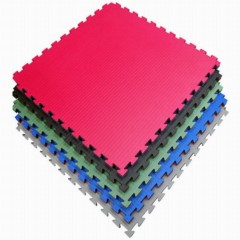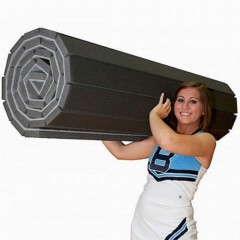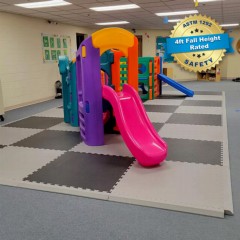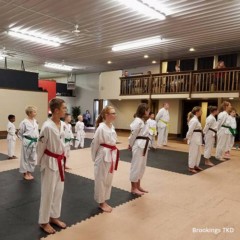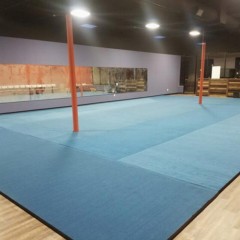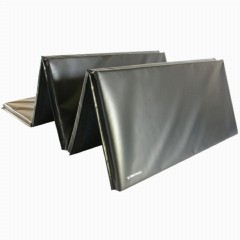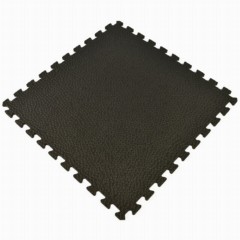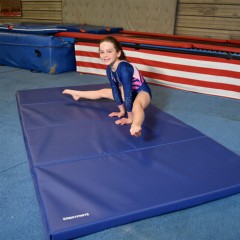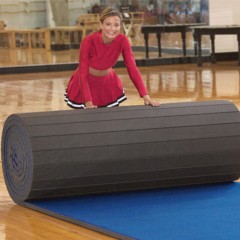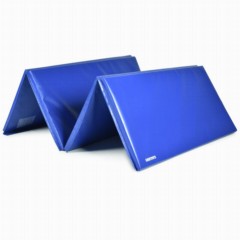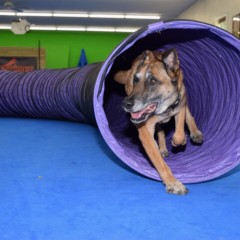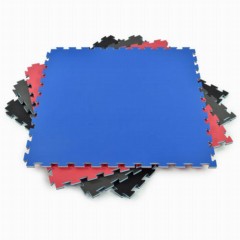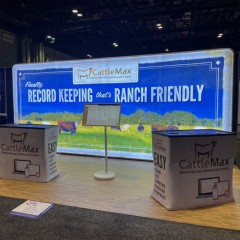
Foam Flooring Options
Foam flooring is among the most versatile materials for creating a floor. It appears in configurations that deliver a firm footing for making quick movements, such as are important for athletics. It also is available in highly cushioned configurations that provide shock absorption and fall protection. And some configurations provide both. The Greatmats customer service team can help you find the perfect type of foam flooring when you describe the needs you have.
Places You Can Use Foam Flooring
Foam mat flooring is popular for many different use cases and layouts. Some of the areas where you can use foam tile flooring include:
- Kids’ play areas
- Kids’ bedrooms
- Exercise rooms
- Basement floors
- Home gyms
- Yoga studios
- Daycare flooring
- Martial arts studios
- Trade shows
Our foam floor mats really have very few limits on where you can install them. However, if you’re ever unsure whether you can use the padded flooring for a particular idea you have, reach out to the Greatmats customer service team.
Types of Foam Flooring You Can Use
The versatility found with foam flooring exists because of the multiple different designs available. You can select among varying colors and patterns, ensuring the design matches the use case.
Multiple thicknesses and sizes are available, too, so you can further match the use case to the option that you select. Some of the different configurations available include:
- Style: Mat, tile, and roll
- Thickness: 3/8 inch, 1/2 inch, 5/8 inch, 3/4 inch, 1 inch, 1-1/2 inch, 2 inches, and more
- Dimensions: 1x1 foot, 18x18 inches, 2x2 foot, 1x1 meter, 4x8 feet, and more
- Material combinations: Foam only, carpet bonded foam, rubber foam blend, vinyl bonded foam, vinyl covered foam, and more
- Texture pattern: Diamond, tatami, vented, thatch, and smooth
- Color and pattern: Yellow, red, green, blue, pink, purple, white, black, orange, gray, faux wood grain, and more
Foam Flooring Q&A
What is the softest flooring?
A
soft foam floor instantly creates a cushioned environment in any room. Lay it over hard floors, resulting in a playroom that's safer for kids. It also works as a toddler play mat, softening the blow if the child falls while learning to walk. Keeping these foam play mats clean and safe is a simple process, too.
What’s the best soft flooring option for a kids’ bedroom?
Soft flooring for a kids’ bedroom should be thick enough to protect against falls. It should have a slip-resistant surface to help kids avoid falling when running. An easy-to-install design is nice for parents who want to do a DIY flooring job. Foam floors that require minimal maintenance are helpful as well.
Is it easy to install foam flooring tiles?
Many
interlocking foam tiles are very easy to install. Some designs have puzzle-style edges that just pop together. They often are easy to cut with a utility knife and straightedge, so you can fit them tight to a wall. Some models ship with border pieces that connect to the main tile’s puzzle edge, simplifying the process of creating a straight edge.
Where would you use foam flooring rolls?
Making use of a foam flooring roll is ideal as a subfloor underneath a harder type of floor, providing cushioning. The roll also helps to cut down on noise generation. Some of the areas to use this type of subfloor include a professional gymnasium, workout space at home, martial arts studio, cheer studio, or gymnastics studio.
What thicknesses are foam flooring available in?
Different
thicknesses of foam floors provide varying levels of cushioning and shock absorption. Rolls typically range from 1.25 to 2 inches of thickness. Tiles can range from 0.375 to 1.5 inches in thickness. Foam floor mats have the most versatility in terms of thickness, ranging from 1 to 12 inches.
 $3198 /Tile You Save 25%$2.97/sqftShips Out in 1-3 Working Days SustainableShop$3198 /Tile You Save 25%$2.96/sqftShips Out in 1-3 Working Days SustainableShop$2198 /Tile You Save 24%$2.04/sqftShips Out in 1-3 Working Days SustainableShop$1,10484 /Roll You Save 20%$4.38/sqftShop$16325 /Mat You Save 39%$4.08/sqftShips Out in 1-3 Working DaysShop$489 /Tile You Save 55%$1.26/sqftShips Out in 1-3 Working DaysShop$24544 /Mat You Save 14%$4.91/sqftShips Out in 3-5 Working DaysShop$12450 /Mat You Save 43%$3.89/sqftShips Out in 1-3 Working DaysShop$86196 /Roll You Save 20%$3.42/sqftShop$8250 /Mat You Save 38%$2.58/sqftShips Out in 1-3 Working DaysShop$1949 /Tile You Save 29%$1.81/sqftShips Out in 1-3 Working DaysShop$57362 /Mat You Save 15%$5.74/sqftShips Out in 3-5 Working DaysShop$2450 /Tile You Save 21%$2.28/sqftShips Out in 1-3 Working Days SustainableShop$1649 /Tile You Save 24%$1.53/sqftShips Out in 1-3 Working Days SustainableShop$13975 /Kit You Save 30%$1.44/sqftShips Out in 1-3 Working DaysShop
$3198 /Tile You Save 25%$2.97/sqftShips Out in 1-3 Working Days SustainableShop$3198 /Tile You Save 25%$2.96/sqftShips Out in 1-3 Working Days SustainableShop$2198 /Tile You Save 24%$2.04/sqftShips Out in 1-3 Working Days SustainableShop$1,10484 /Roll You Save 20%$4.38/sqftShop$16325 /Mat You Save 39%$4.08/sqftShips Out in 1-3 Working DaysShop$489 /Tile You Save 55%$1.26/sqftShips Out in 1-3 Working DaysShop$24544 /Mat You Save 14%$4.91/sqftShips Out in 3-5 Working DaysShop$12450 /Mat You Save 43%$3.89/sqftShips Out in 1-3 Working DaysShop$86196 /Roll You Save 20%$3.42/sqftShop$8250 /Mat You Save 38%$2.58/sqftShips Out in 1-3 Working DaysShop$1949 /Tile You Save 29%$1.81/sqftShips Out in 1-3 Working DaysShop$57362 /Mat You Save 15%$5.74/sqftShips Out in 3-5 Working DaysShop$2450 /Tile You Save 21%$2.28/sqftShips Out in 1-3 Working Days SustainableShop$1649 /Tile You Save 24%$1.53/sqftShips Out in 1-3 Working Days SustainableShop$13975 /Kit You Save 30%$1.44/sqftShips Out in 1-3 Working DaysShop



